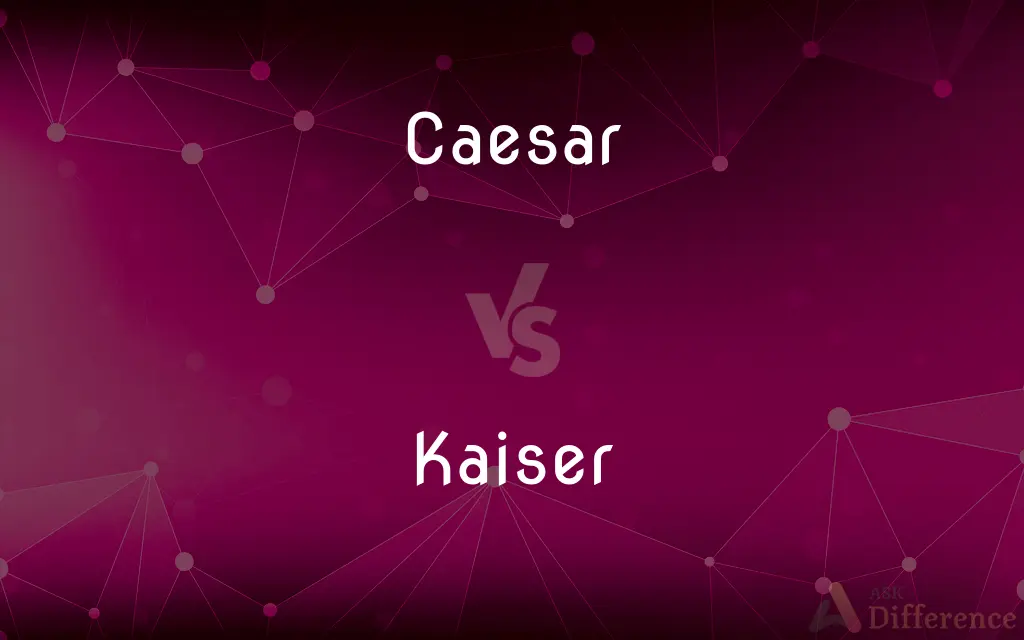Caesar vs. Kaiser — What's the Difference?
By Fiza Rafique & Urooj Arif — Updated on May 12, 2024
"Caesar" originally refers to Julius Caesar, becoming a title used by Roman emperors, symbolizing imperial authority. "Kaiser" is the German word for "emperor," derived from "Caesar," used by German emperors, especially those ruling the Holy Roman Empire.

Difference Between Caesar and Kaiser
Table of Contents
ADVERTISEMENT
Key Differences
"Caesar" was initially the family name of Julius Caesar, which evolved into a title for Roman emperors following his assassination; "Kaiser," meanwhile, is directly borrowed from the Latin "Caesar" and adopted in German-speaking regions to denote their emperors.
The title "Caesar" came to represent ultimate secular authority in the Roman Empire, signifying the ruler of the state; whereas "Kaiser" was used in Germany and Austria to denote similar sovereign authority, reflecting the continuation of the Roman legacy in these regions.
In the Roman context, "Caesar" was part of a broader imperial title and was used to denote both senior and junior emperors during the Tetrarchy; on the other hand, "Kaiser" specifically referred to the singular head of state in the German Empire.
The cultural impact of "Caesar" extends into modern terminology in politics and culture, symbolizing autocratic power and control; "Kaiser," however, while also symbolizing strong leadership, often carries historical associations specifically with German nationalism and militarism.
The use of "Caesar" in titles faded after the fall of the Byzantine Empire, but "Kaiser" continued to be used until the abdication of Wilhelm II in 1918 following World War I.
ADVERTISEMENT
Comparison Chart
Origin
Julius Caesar, a Roman general.
Derived from "Caesar" in German.
Meaning
Emperor or ruler in Roman context.
Emperor in German-speaking regions.
Usage Period
From 49 BC to 1453 AD.
Roughly 800 AD to 1918 AD.
Cultural Symbolism
Autocratic rule, imperial power.
German nationalism, leadership.
Associated Empires
Roman Empire, Byzantine Empire.
Holy Roman Empire, German Empire.
Compare with Definitions
Caesar
Part of the imperial succession, later becoming a junior or subordinate emperor title during the Tetrarchy.
Under Diocletian’s rule, Caesar was a title for junior co-emperors.
Kaiser
Represents the German adaptation of the Roman imperial tradition.
The adoption of Kaiser was a declaration of continuing the legacy of the Roman emperors.
Caesar
A historical title with significant political and cultural impact through the ages.
The term Caesar is studied extensively in classical studies for its implications in governance and authority.
Kaiser
Associated with German militarism, particularly during the World Wars.
The term Kaiser brings to mind the militaristic policies of the German Empire.
Caesar
A title used by Roman and Byzantine emperors.
Augustus was the first Roman emperor to use the title Caesar as a mark of imperial authority.
Kaiser
Ceased to be used as a political title after 1918, following the defeat in World War I.
The abdication of Kaiser Wilhelm II marked the end of the German monarchies.
Caesar
Denotes autocratic leadership, often used metaphorically in modern contexts.
In many corporate environments, the CEO is jokingly referred to as Caesar.
Kaiser
The German term for "emperor," particularly associated with the rulers of the German Empire.
Kaiser Wilhelm II was the last German Emperor and King of Prussia.
Caesar
A title used by Roman emperors, especially those from Augustus to Hadrian.
Kaiser
Used as a title in German-speaking lands, originally deriving from the Holy Roman Emperors.
Kaiser Franz Joseph I was a long-reigning emperor of Austria.
Caesar
A caesarean section.
Kaiser
Kaiser is the German word for "emperor" (female Kaiserin). In general, the German title was only used for rulers above the rank of king (König).
Caesar
Used as a title and form of address for Roman emperors.
Kaiser
Any of the emperors of the Holy Roman Empire (962-1806), of Austria (1804-1918), or of Germany (1871-1918).
Caesar
A dictator or autocrat.
Kaiser
Used as the title for such a man.
Caesar
Emperor, ruler, dictator
Kaiser
Alternative form of Kaiser.
Caesar
Alternative form of Caesar
Kaiser
The ancient title of emperors of Germany assumed by King William of Prussia when crowned sovereign of the new German empire in 1871.
Caesar
Any agaric mushroom of the genus Amanita, section Amanita sect. Caesareae''.
Kaiser
The title of the Holy Roman Emperors or the emperors of Austria or of Germany until 1918
Caesar
A Roman emperor, as being the successor of Augustus Cæsar. Hence, a kaiser, or emperor of Germany, or any emperor or powerful ruler. See Kaiser, Kesar.
Malborough anticipated the day when he would be servilely flattered and courted by Cæsar on one side and by Louis the Great on the other.
Caesar
Conqueror of Gaul and master of Italy (100-44 BC)
Caesar
United States comedian who pioneered comdey television shows (born 1922)
Caesar
Symbolizes the Roman heritage and authority.
Caesar became a generic term for an emperor in many parts of Europe.
Common Curiosities
What was the original significance of "Caesar"?
Originally the family name of Julius Caesar, it evolved into a title representing imperial authority in Rome.
How do the connotations of "Caesar" and "Kaiser" differ?
"Caesar" broadly symbolizes imperial power and autocracy, while "Kaiser" is more specifically linked to German nationalism and leadership styles.
What does "Caesar" signify in Roman culture?
In Roman culture, "Caesar" signifies imperial authority and control, originally associated with Julius Caesar and subsequently used as a title by his successors.
Are "Caesar" and "Kaiser" used today?
"Caesar" is used metaphorically to denote authority or autocratic rule, while "Kaiser" is no longer an official title but is used historically.
What historical events led to the rise of Kaisers in Germany?
The rise of Kaisers in Germany began with the crowning of Charlemagne as Emperor by the Pope, which was seen as a revival of the Roman Empire in the Germanic territories; this tradition continued through the Holy Roman Empire and into the German Empire in 1871.
What was the role of a Kaiser in the German government?
The Kaiser served as the emperor and head of state of Germany, wielding significant political and military authority, particularly during the German Empire from 1871 to 1918.
What is the difference between "Caesar" and "Kaiser" in terms of usage?
"Caesar" was used across a broader timeline and context, including the Byzantine Empire, while "Kaiser" was specifically used in German-speaking regions until the end of World War I.
Can "Caesar" be used in a non-historical context?
Yes, "Caesar" can be used metaphorically in non-historical contexts to denote someone in a position of great power or authority, often with a connotation of autocratic tendencies.
How did "Kaiser" originate?
"Kaiser" is derived from "Caesar," adopted by German rulers to emphasize their status as emperors in the Roman tradition.
How did the title "Caesar" evolve in the Roman Empire?
The title "Caesar" evolved from being the family name of Julius Caesar to a title used by his adopted heir Augustus and later became a title for junior co-emperors or heirs apparent during the Tetrarchy.
Share Your Discovery

Previous Comparison
Manhua vs. Manhwa
Next Comparison
Warden vs. WarderAuthor Spotlight
Written by
Fiza RafiqueFiza Rafique is a skilled content writer at AskDifference.com, where she meticulously refines and enhances written pieces. Drawing from her vast editorial expertise, Fiza ensures clarity, accuracy, and precision in every article. Passionate about language, she continually seeks to elevate the quality of content for readers worldwide.
Co-written by
Urooj ArifUrooj is a skilled content writer at Ask Difference, known for her exceptional ability to simplify complex topics into engaging and informative content. With a passion for research and a flair for clear, concise writing, she consistently delivers articles that resonate with our diverse audience.













































